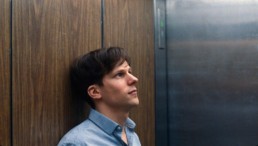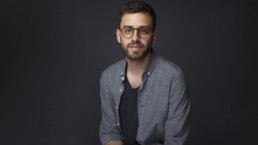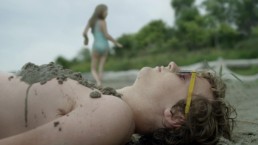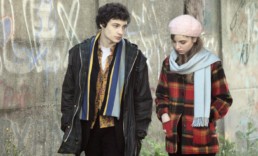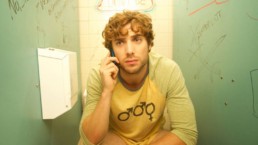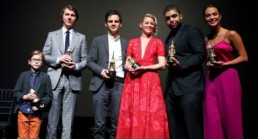'Louder Than Bombs' Review: Confronting the Human Desire for Connection
Director Joachim Trier makes his English-language debut with the drama Louder Than Bombs, an intimate portrayal of one family's relationship and the struggles they must overcome in the face of death. The film made its debut at the 2015 Cannes Film Festival and is sure to make waves in the indie/art-house film scene.
The Painful Aftermath of a Mother's Death
Isabelle Reed (Isabelle Huppert) a famed photographer who feels most comfortable in war and conflict-ridden areas, is the center of her husband Gene (Gabriel Byrne) and their two sons, Jonah (Jesse Eisenberg) and Conrad (Devin Druid), worlds. No one could have predicted that she would leave behind a familial conflict of her own doing after her untimely and suspicious death. Three years after the accident, Isabelle's works are thrust into the spotlight when a museum in New York asks to use her photographs for a retrospective gallery installation. Her husband accepts, as he is slowly moving on with his life, and sees this as a great opportunity to honor her.
However, he discovers that an accompanying New York Times article speculating Isabelle's actual cause of death is set to run simultaneously with the gallery opening. This threatens to expose the devastating truth that Gene is intent on hiding from Conrad. He has no choice but to enlist his oldest son Jonah to help him with another painful confrontation.
Confronts the Human Desire for Connection
Louder Than Bombs is an unwavering look at the human desire for connection and the need to be understood. It's obvious in Conrad's behavior as he alienates himself from his father's attempt to reconnect. It's also seen in Jonah's promiscuity, even when he has a wife and newborn baby at home. Gene's attempt to bond with his two sons is affected by his flaws. This humanistic condition for connection is at the forefront of the film. It engages the audience in contemplating how and why we act the way we do, focusing on the relationships within our own family.
What sets Louder Than Bombs apart are the surreal moments Trier infuses within the story. He disregards the traditional method of linear storytelling by shifting between the past and the present. These added moments put visuals to feelings that have a hard time being expressed otherwise. They are not the character's dreams, rather, they are daydreams- or what one wonders about without limitations. These moments are hauntingly beautiful and stand out as works of art.
Jesse Eisenberg Leads this Excellent Cast
On the acting front, the assembled cast could not have been better. Jesse Eisenberg is fantastic in the role of Jonah. His trademark quick-witted clamor serves as the voice of reason in the film. Gabriel Byrne plays Gene with sensitivity as a conflicted father who is not without his flaws. Devin Druid embodies the angsty, brooding teenager while still holding onto the innocence of being a misunderstood child. These, plus the stellar performances from Isabella Huppert, David Strathairn, and Amy Ryan, truly give the film its footing.
Takeaway
The title- Louder Than Bombs- suggests an epic, grandiose drama. Instead, Trier creates a meditative and restrained film that is not loud or brash. Rather, it celebrates uniqueness and coming together to fulfill the family dynamic. There is no doubt that Joachim Trier took a risk with Louder Than Bombs. I believe his creative vision has the potential to pay off tenfold.
'Take Me to the River' Director Matt Sobel Talks the Nightmare That Inspired the Film
On the day of the theatrical release of his debut film, "Take Me to the River," director Matt Sobel took a few minutes to chat with us about the 2015 Sundance darling. The film stars Logan Miller as Ryder, a gay teenager from LA who is none too pleased when his parents decide to drag him to rural Nebraska for a family reunion. The ensuing collision of value systems causes tensions to rise -- eventually threatening to expose a painful family secret. We talk about how a nightmare inspired the film's story, his likeness to the protagonist, Ryder, and dissecting what his family's saying "If it don't scare the horses" means to him. We begin:
Was the idea for "Take Me to the River" something you've been holding onto for awhile?
Yeah, I wrote it my senior year of school. I didn't go to film school [Sobel studied fine arts at UCLA] but I always knew how I wanted the film to feel. I was figuring out the logistics and the industry on my own, so it was a bumpy ride to say the least.
This film felt and looked exactly like my family reunion in Idaho a few years ago. Eerily similar. How personal was this film for you?
The farm in the film is my family’s actual farm in Nebraska, and I grew up going to that family reunion. The location and set up is entirely real. [Like Ryder] I was the only cousin not from Nebraska. For example, the scene where his cousins ask him to draw them all pictures, that was me. Another similarity about my family [and the family in TMTTR], which has maybe been heightened from heritage, is the inability to speak about interpersonal issues. That is a very midwestern mentality. My family has a saying, "If it don't scare the horses." What they mean by that is if it doesn't disturb business on the farm, then there's no business in talking about it.

Is it fair to say you purposefully pushed audiences to the brink of their comfort zone?
Definitely, I wanted to push viewers in the writing of the script, but especially in the editing. I was always looking for opportunities to not allow the audience a traditional moment of relief. In many films, there is a balance of mounting tension followed by relief. It is a little unorthodox to cut out all of the moments of relief, but that's what we did here. An obvious example of this is the scene with Ryder (Logan Miller), his Uncle Keith (Josh Hamilton), and the loaded gun. The result we wanted was the slow broiling, ratcheting up of tension.
This being your debut feature film, what are you most proud of?
I feel like capturing the uncanny dreamlike tone was the hardest part. The idea for the film came from a nightmare and I wanted it to feel that way in the movie. It's hard to recreate the feeling of a dream in a film because usually they feel overworked. While you're dreaming, the events taking place don't seem so strange, just a little off, but you can't understand why. I would say Take Me to the River is closer to uncanny than surreal because it is simultaneously familiar and unfamiliar. I realized the creepiest thing would be to shoot it like an awkward scene out of a comedy. We wanted to send the audience mixed signals about how they should feel in a certain scene, and I feel like we achieved that. That was the most rewarding because we spoke about achieving that visceral aesthetic the most out of everything.

What were you looking for in casting your actors?
Robin Weigert has an incredible mind, she is an intelligent, brilliant person. When she came on the project, we spoke regularly about elaborating the backstory in different drafts of the script. The draft that she read when we began was markedly different than the one that we ended up shooting. She had quite a lot to say about the topics of childhood sexuality, the role that shame plays in adults chastising children for what is a natural exploration of our bodies. Her input was really invaluable. With Logan, I was looking for someone who seemed to be completely at ease in this world of extreme awkwardness, someone who was able to bounce back and forth between wanting to scream and wanting to laugh. While he maybe wasn't the most obvious, he was the right choice. His intuition would always be in the right emotional space. With Josh Hamilton, I was looking for someone who would surprise us, who wasn't instantly readable as "the villain". He would rise out of the ensemble and unnerve us with deadpan motivation.
Rivers usually symbolize rebirth or baptism, but in this film, it doesn't seem so pure.
Yes, we had extensive conversations about symbolic nature of the river. I feel like it does represent a sort of baptism, a coming-of-age. However, Ryder's coming of age doesn't end with him finding his path in life, he's actually less sure about life than before. He began overly confident in himself but ends up feeling like the world's more gray. Because of this, I like to describe Take Me To The River as an inverted coming-of-age story. This is more what ‘real life’ coming-of-age is like—the moment when you realize you don’t know as much as you thought you did. I’m also interested in equating growing up with a type of baptism, or more specifically, a reverse baptism. Becoming an adult, as I see it, is more of a muddying than a cleansing. That's also why we chose the image for the poster- the symbolism of Ryder lying on the river bank with mud on his body.

What was it like showcasing the film at Sundance in 2015?
The first time I went to Sundance was on a family trip when I was 13, and the first movie I ever saw was Memento. We had tickets for another movie later that day but we decided to skip it and just go to dinner and talk about what we just watched. For me, that became the mark of a film's success or not- if you want to keep talking about it after the movie's over. We actually screened Take Me to the River in the same room [the Library Theater] that I saw that first film, Memento, in, so it's been very special.
What's next for you?
I'm attached to direct the screen adaptation of Maggie Stiefvater's New York Times bestselling young adult novel, The Scorpio Races, which couldn't be more different. This film taps into another part of me. Growing up my favorite film was Jurassic Park, and this film falls in the same vein as that. The chance to make young audiences feel like I how I felt about Jurassic Park, I couldn't pass that up. I'm also writing a science-fiction film that's set in China about 2 orphan sisters who are recruited by a Chinese sports camp to be trained as Olympic synchronized high-divers.
'Take Me to the River' Will Push Viewers to the Brink of Their Comfort Zone
Director Matt Sobel has quite the impressive debut at hand in Take Me to the River, a film whose quietly commanding presence captivated audiences at the 2015 Sundance Film Festival and is now making its way to theaters this Friday.
"Mom, have you told the Nebraskan family I'm gay?"
This is how the film begins, as 17-year-old Ryder (Logan Miller) asks his mother (Robin Weigert) from the backseat of the car on their way from California to their annual family reunion in Nebraska. His father (Richard Schiff) struggles to find the words, finally settling on telling him that "he shouldn't make this event all about him." So, no, they didn't tell the extended family.
Enduring the stereotypical family reunion activities like group pictures and big barbecues, Ryder's approach to the experience is cautious, guarded even. He has a hard time fitting in with his male cousins who are quick to judge him on his "short" shorts and attire, so he befriends his younger female cousins who are infatuated with their cool "Californian" big cousin. 9-year-old Molly (Ursula Parker), with the confidence of a woman four times her age, asks Ryder to go out to the barn with her. He obliges, and they leave the house for the barn about one hundred feet away.
This is where the monotony of the reunion gets turned upside down. What happens isn't immediately clear, but Molly, obviously traumatized, comes screaming from the barn, her dress blood-stained near her upper thighs. Ryder follows after, confused and quiet. The way this scene plays out makes for a very uncomfortable watch for the viewer, so much so that it gave me a knot in my stomach. We believe in Ryder's innocence, but the situation is odd; he is openly gay to his immediately family but closeted to his extended one, his mother begging him not to come out even thought it would clear his name from any wrongdoing because "her family isn't very accepting and it would just be one more thing."
Sobel captures the claustrophobic, yet well-intentioned environment of the family reunion so perfectly, it's as if we're transported amongst the alfalfa fields and Nebraskan humidity. Take Me to the River's authenticity shines through the saturated visuals, as Ryder follows the tension-ridden string of truth to uncover his darkly disturbing family history. While shot like a slice of life narrative, the film pushes the comfort-zone of the viewer to the edge like not many films, let alone small budget independent ones, can.
Major recognition goes to 24-year-old Logan Miller, whose previous film experience includes The Stanford Prison Experiment and Scouts Guide to the Zombie Apocalypse. No other actor could have done a better job than Miller, his innocence and angelic portrayal of Ryder makes him the perfect unsuspecting target and sympathetic hero.
Take Me to the River will have viewers on edge for its entire 84-minute runtime. Sobel has managed to mix the beauty of the Nebraskan, small town farm life with the scandal and mystery of a thriller, minus the genre cliches and tropes. Many times, a river is a symbol of rebirth, symbolic of baptisms to cleanse one's sins. Here, this river is the devil's playground.
Take Me To The River opens this Friday at Landmark's Nuart with a theatrical rollout to follow
Tom Hiddleston, Elizabeth Olsen, and Director Marc Abraham On 'I Saw the Light'
[soundcloud url="https://api.soundcloud.com/tracks/254333941" params="color=ff5500&auto_play=false&hide_related=false&show_comments=true&show_user=true&show_reposts=false" width="100%" height="166" iframe="true" /]
Tom Hiddleston, Elizabeth Olsen, and director/writer/producer Marc Abraham take their seats at The London Hotel in West Hollywood, where we are all about to begin the long-awaited press conference for the new Hank Williams biopic, "I Saw The Light." The film, which was originally set to release in November of last year, is finally making its way to a limited theatrical release this Friday, with a nationwide roll-out April 1st. Hiddleston, the tall, handsome British actor, best known for his role as 'Loki' in the Marvel Cinematic Universe, talks about transforming into an American-folk icon, while Olsen talks about leaving her own Marvel characters behind to "bleed into" the role of 'Audrey Williams'. We begin:
Would you say "I Saw The Light" changed your perspective of country music in America?
Tom Hiddleston: Yes it has. What I find interesting about American country music is that it's an expression of the authentic soul of the country. When you get under the skin of a country's folk music, you start to understand their instinctive rhythm. When I went to Nashville and spent some time preparing for this I started to understand that country music is America's folk music that comes from the blues. That gave me a whole new appreciation for it, which has been really thrilling.
What was the most difficult song for you to perform?
TH: Probably 'Lovesick Blues'. Of all the songs Hank sang, he probably sang that the most. It's a very technically difficult song with all the yodeling and jumping octaves and to be on-pitch with every note was really challenging. We had to pre-record certain tracks because of the way we were going to shoot the film. They each had to have a certain atmosphere because some of them were radio station tracks, some were in-studio and others were live performances. Some came very quickly and easily to me, and others didn't. I recorded 'Why Don't You Love Me' in an hour. It took me about 10 days to record 'Lovesick Blues'.
Marc Abraham: From the moment I wrote the script and decided to make the movie, I was intent that we would not be lip-synching [to Hank Williams] in the film. Whoever would play the part would have to sing it. Tom and I both knew from the very beginning that he would never sound exactly like Hank Williams, but what Tom was able to do was inhabit the character so that in the end, it didn't matter that he didn't sound exactly like Hank Williams. What we wanted was for you to feel like he was Hank Williams.

Audrey obviously craved the spotlight herself, can you talk about getting into that character?
Elizabeth Olsen: The thing I kept trying to fight Marc on was all of her lines wanting to sing with him, I was like, 'It just makes her sound so awful.' The truth is after Hank passed away, she still worked at it. She put her kids and herself onstage and there are videos of her on YouTube still singing, so I had to just embrace it even though it's an unlikeable characteristic.
How did you bring authenticity to the roles of Hank and Audrey?
EO: It's two-fold playing someone who really existed; you have a lot of responsibility and you're also trying to create more of a three-dimensional person than what the legacy or stories have. You also have the gift of a lot of additional source material. [As an actor], you start there, with the photographs, the personal belongings, books, documentaries. Then there comes a point where you've done all your work and it's time to bleed into the character.
TH: The most fascinating thing about acting is finding the common ground between yourself and the character, and that becomes even more fascinating when the character is so far away from you as Hank was for me. I made all the physical changes- like how I looked and the way I sounded- but at a certain point, the challenge is to commit yourself to experiencing the intensity of his emotional life. That is the actor's duty, and the fun part.
MA: For me, what's authentic is who the people really are, and what that requires is finding someone, in this case, Tom and Lizzie. You have to believe that inside them is the ability to actually become that person. They're never going to become the exact person, they're going to become the version of the person that they best believe in. I didn't want to make a movie about when he was born or where he learned how to play the guitar, I wanted to get to the human condition and that's what Elizabeth and Tom brought.

If you could each take home a costume piece or a prop, what would it be?
EO: I had a blue and brown dress I really liked, there is no significance behind it aside from I thought it looked good on me, haha!
TH: I played some beautiful guitars. And also (points to poster) these boots are the real deal. They were made especially for me and every time I wore them I was like 'These are shit kickers' these things, they were great.
(Laughter)
MA: Actually the costumes will be shown at the Autry Museum soon, they loved the costumes so much they asked to exhibit the costumes at their grand opening.
As much as Hank Williams and his music are a part of Americana history, so are the clothes. How important were the costumes and their authenticity to the film?
MA: What we tried to do with Elizabeth and Tom, and this was really important to me in the movie, is that these people weren't the same people when they were not on stage. When we didn't see Audrey or Tom on stage, we saw them how they normally dressed, and that they weren't a bunch of hillbillies. They were real people who didn't wear a ton of different clothes. Hank always had a hat on, Audrey had a good sense of style. The subtlety of if was really important. So, yes, those costumes that we put on stage were really important to get completely right, but when they were offstage in their real lives, it was just as important that they weren't always dressed up.
TH: When you put those costumes on you just feel different. It's just like what Marc was talking about- the difference between the public persona of the performer and the private identity of the man.

Tom, is it true you met with Hank Williams' family?
TH: On the set I met Jett Williams who is the daughter of Hank and Bobbie Jett. There is a scene in the film where Bobbie tells Hank she's pregnant with his child and Jett was born four days after Hank died. Jett never met her father. She had a complicated history where she never knew she was Hank's daughter until she was quite older. The day she came on set, I was able to spend an extended lunch with Jett and she said it was like looking at a ghost. It was a couple of hours of accelerated intimacy because I had spent months immersing myself into the life of her father.
Tom and Lizzie, you both have experience doing blockbuster Marvel films. Do you find it refreshing to play a role that's based on a true story?
EO: There's a lot of original source material in the Marvel land!
(Laughter)
TH: The interesting thing about this question is that I think for the audience, the difference is greater than for actors. Our job, our obligation and our duty is to step into characters and play them truthfully, whether that's a Norse god of mischief or a real-life American icon. In terms of that commitment of empathy and psychological excavation, to me there is actually no difference - I'm flexing the same dramatic muscle. Of course, it's different in process. We were able to inhabit locations without any sort of green screen or special effects, so in that regard it's different.
EO: I agree that the way you approach characters is different, but for me it is a breath of fresh air to be on an intimate set and have momentum and to not wait around in a trailer for six hours and then you have 30 seconds to save the world in one look. That's a lot of pressure!

'My Golden Days' Is a Nod to French Cinema's Classic Coming-Of-Age Tales
Director Arnaud Desplechin is a noted name in French cinema whose works have been festival favorites at Cannes and the César Awards, just to name a few. In a prequel to his previous film My Sex Life... Or How I Got into an Argument, his latest film, My Golden Days tells the origin story of protagonist Paul Dédalus, in which Quentin Dolmaire reprises his role as the adolescent Paul, through a series of three distinct flashbacks as he reminisces about his childhood, his life, and his former true love.
This coming-of-age tale reveals Paul as a grown man (Mathieu Amalric) who returns to Paris to take a new job. He is stopped by security and forced to explain some questionable events in his past that lead to this point. Here, Paul begins his journey down memory lane, which began with a troubled childhood, and included a mentally unstable mother and depressed father. He remembers an unorthodox trip to the USSR in which he offered up his identity to a stranger, a man whom he still considers his phantom twin. Heis overcome with emotion when reminiscing about the love of his life, Esther (Lou Roy-Lecollinet), and the tortured yet beautiful young woman he once knew.
The risk My Golden Days takes by including three flashbacks is what not only gives the film life but allows every moment to have a different temperament and tone. The first flashback is dark and straightforward, the second is intense and exciting while the third is fragile and takes the most cinematic risk using split screen effects, breaking the fourth wall. It is reminiscent of classic French films from the 80's mixed with a Wes Anderson quirkiness.
Perhaps one would benefit from having seen My Sex Life... Or How I Got into an Argument before watching this film, although it is not necessary to enjoy the story. First-time actor and Bridget Bardot lookalike Lou Roy-Lecollinet is a magnet on screen and her vulnerabilities play perfectly to Mathieu Amalric's restrained control and confidence. Using offbeat humor and emotional sensitivity, My Golden Days is an ode to youth culture and its enchanting unknowns.
My Golden Days opens Friday, March 18th at the Landmark
'Me Him Her' Is a Colorful Max Landis Rom-Com
If the name Max Landis sounds familiar, then you probably already know to expect high energy, slightly silly, and oddly off-beat indie movies from the young screenwriter, which he delivers here with Me Him Her, a madcap joyride of a comedy that makes for a solid directorial debut and should stand as another achievement in Landis' already colorful career. Landis, whose father is the legendary director John Landis (The Blues Brothers, Animal House), has already made a name for himself in Hollywood, penning screenplays for such cineplex hits as Chronicle and American Ultra.
In the queer-aimed Me Him Her, two bi-coastal college friends reunite when Brendan (Luke Bracey), an actor living in Los Angeles, asks Florida-set Cory (Dustin Milligan) to fly to L.A. to help him keep his newly-realized homosexuality a secret, right before his big TV series debut.

Cory agrees and persuades Brendan to meet Brendan's crush at a gay bar, only to meet Gabbi (Emily Meade), a lesbian whose distressed flannel looks about as beat up as she feels. Cory and Gabbi's flirty, albeit drunken, banter, leads to a passionate one-night stand and an even bigger hangover, where a confused Gabbi leaves her mistake (AKA Cory) stranded in Santa Monica and deems to get her life together once and for all. The humor in Me Him Her comes into play when Brendan, Cory, and Gabbi are forced to face the relationship problems that millennials know all too well while struggling to stay true to themselves in a superficial town like Hollywood.
Landis' story of finding love in present-day Los Angeles may ring true to those who frequent gay bars and pride parades, but for the most part, this rom-com is entirely satirical and pokes fun at itself and the city in general. Brendan is told by his agents, tongue-in-cheek, that he "can't come out casually – it either has to be a secret or a career move." While not heavy-handed, Landis does manage to ever so slightly lift the lid on Hollywood's narrow-mindedness when it comes to the taboo of homosexuality in film and television, and seeing this struggle through Brendan's eyes makes for a unique and interesting perspective.
Small supporting roles from the more recognizable Alia Shawkat, Haley Joel Osment, and Geena Davis are sprinkled throughout the film, which gives it instant clout. The soundtrack is an upbeat mix of artists like Fun., Ingrid Michaelson, and Krewella and would make the perfect Spotify party playlist. If you're into high energy, slightly silly, and oddly entertaining independent films, then add Me Him Her to your movie queue.
In 'The Last Man on the Moon', an Astronaut's Final Story
On Wednesday, February 24th, scientists detected the origin point of a space radio signal 6 billion light-years away and managed to find the universe's missing matter as a result. This incredible discovery is a strong reminder of how far we've come since 1969, the moment when Apollo 11 astronaut Neil Armstrong declared the first successful mission to the Moon as One small step for man, one giant leap for mankind. Since Armstrong, twelve men in total have walked on the moon during the Apollo missions from 1969-1972. Of these 12, Eugene “Gene” Cernan was the last, and the documentary The Last Man on the Moon is his story.
Cernan's story is a unique one; a former Navy captain, his journey towards becoming a NASA astronaut started with a simple phone call. In 1961, President John F. Kennedy set the bar high for U.S. space exploration, putting pressure on the space program to be the first country to land on the moon. This public assignment given to NASA resulted in an increased demand for anyone willing to participate in the program, which lead to more opportunities for people like Gene to join. Getting his foot in the door was the easy part, he realizes in hindsight. The intense training that each of the aspiring young men endured, including desert survival, water survival, and jungle survival just to name a few, was the hard part. The best thing to come from that experience, Gene remarks, was the strong bonds he made with the other men.
His close friendships with his co-workers also made the tough times almost unbearable. Two deadly events, the unexpected crash of Gemini 9 which claimed the lives of the two pilots in his crew as well as the emotional Apollo 1 fire of 1967, when his neighbor and good friend Roger Chaffee and two other men died as a result of a flash cabin fire in the shuttle, shook up Cernan's world. At the time, he was married with a young daughter and the thought of never seeing his family again was extremely hard on him. However, when he was selected to be a part of the Apollo 17 crew, NASA's last mission to the moon, Cernan couldn't say no.
Cernan spent three days on the moon. Right before he was about to leave, and knowing that man may not be back on the moon again for years, he left his footprints and wrote his daughter's initials in the lunar dust. He describes this moment with such intimacy and detail that it's truly humbling to listen to him.
It does not feel like a traditional "documentary-style" film, thanks to the stylized approach from director Mark Craig as he strikes the perfect balance between the portrayal of Gene's personal and work life. He cuts between Gene in the present day with archival footage of his time at NASA, which, photographically, feels like a subtle effort to relive his experience. The B-roll of various space missions really does make The Martian look like a comedy. The Last Man on the Moon is a top notch documentary that feels like a perfect fit on the HBO or Showtime roster. It is humbling, poignant, hard-hitting, and emotionally charged, on top of being aesthetically rich and visually beautiful. Without giving too much away, I can say that the last shot will take your breath away as it did mine.
The Last Man on the Moon is not all happy endings. This is a deeply personal film for Cernan which is why it took until now, 40 years since his return to earth, to share his story. Now living on a ranch in Texas, Gene still works to this day, as his friends and family admit that "retirement" is not in his vocabulary. This film and its message is so important and will leave the viewer feeling inspired from both Gene's words and actions. Lightheartedly joking that he can't live forever, he wants to share his knowledge and experience now because he feels an obligation to inform the younger generations about man's potential and inspire hope for the future. "I walked on the moon," he says at the end of the film, "what can't you do?"
Alicia Vikander, Paul Dano, and More Honored with Virtuosos Award [WATCH]
The Virtuosos Award was created to recognize a select group of actors who have distinguished themselves through performances in film this past year, on Morgan chats with Alicia Vikander (The Danish Girl, Ex Machina), O'Shea Jackson Jr. (Straight Outta Compton), and more.
The complete list of winners includes Elizabeth Banks (Love & Mercy), Paul Dano (Youth, Love & Mercy), Joel Edgerton (Black Mass), Géza Röhrig (Son of Saul), and Jacob Tremblay (Room).

